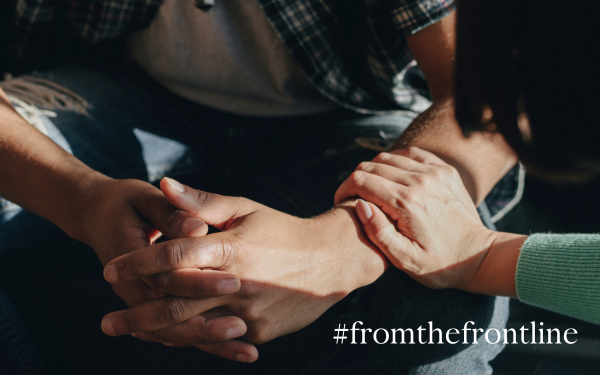'I was close to unable to work': social workers on disclosing mental health struggles at work - Community Care

Photo by rawpixel.com/AdobeStock
Struggling with mental health can be a crippling and deeply isolating experience. It is also one that many social workers know all too well.
Practitioners work with people in crisis, experiencing severe hardship or with significant trauma, often without the resources to make the difference they feel they should be making. Add to that the pressures of high and complex cases, targets and timescales, and the emotional toll of the job can be immense.
In a 2024 poll of over 700 Social Work Union members, over half (52.7%) said their mental health had deteriorated recently due to work, while a further 9.6% said it had “collapsed”.
But mental health struggles are not always tied solely to the job. Personal trauma, life challenges or grief can spill over into work, making it hard for practitioners to stay present or go about work as usual.
Admitting to this struggle is often said to be the hardest step, particularly in a profession built on being the helper, not the one in need of support.
But what happens when a professional does speak up? What support is in place?
For the latest instalment of our ‘From the Front Line’ series, Community Care spoke to three social workers, from children’s and adults’ services, who shared what it was like to disclose their mental health struggles to management.
Towards the end of 2023, when I was a parent assessment practitioner, I started to feel a sense of dissatisfaction.
At first, I thought that maybe I just needed more rest. So I rested. Then I wondered if I needed to work less, so I tried that too. Then, I considered that I needed to spend more time with friends and family, so I reconnected and made time for them. But the feeling didn’t pass.
I felt sad and confused, unable to experience joy and contentment, even though I had an incredible life and a job I’d always been passionate about. I would later come to know that this was depression.
Eventually, the feeling lifted, quite randomly. But several months later, it returned. This time, I was quicker to understand what was happening.
There was a profound, unmovable sadness, a sense of futility, a lethargy and a strong desire to retreat from the world. It seeps into the very core of your being, and it doesn’t have any beginning or end.
It was accompanied by a lot of negative self-talk: “You’re weak. Don’t be pathetic. What have you got to complain about? Better not tell anyone.”
But I was determined to do what the depression tells you not to do: speak about it.
So I talked to people, including friends, family and my manager. And, as a result of those conversations, I contacted my GP and was prescribed antidepressants. They didn’t fix everything, but they took the edge off the sadness and eased my social anxiety, which I hadn’t realised had been affecting me so much.
I also started going to a meditation class once a week. It gave me the chance to reflect and share what I’d been through. I realised that I’d had a lot of strong unprocessed feelings that I’d put aside, thinking there was no point in delving into them when my life had moved on so much.

Photo by AdobeStock/grinny
I was fortunate that my workplace offered a health benefit scheme, which gave me access to face-to-face counselling. I started with six sessions and, when I asked my manager for a few more, they were approved without hesitation.
The support I got from my manager was predominantly emotional – a recognition and validation of what I was feeling. At the time, I felt close to being unable to work. I’ve always been able to work for long hours – this job is my passion – but I could only manage my contracted hours and not a minute more.
But because I felt validated and understood, and was supported to access the therapy, I didn’t need to take a break. Eventually, things settled down.
My advice would be to research the issue. I found a lot of reassurance by watching videos and lectures on depression. When you’re going through something like this, it feels like you’re the only one who’s ever experienced it. It causes a feeling of shame that stops you from talking about it.
Not only are you suffering, but you also start to feel incredibly lonely and disconnected from others. My advice is to be aware of that and to try to counteract it. Find people you can talk to. I was amazed by the conversations I had with friends once I opened up.
The hardest part, I think, is admitting to yourself that you’re struggling. That’s what took me the longest, giving myself permission to have this experience.
Unfortunately, I’ve had a number of struggles, especially early in my career. But the experience I want to talk about is one where I actually got a really positive response from my manager.
One thing I did differently this time was recognising the early signs – things like the Sunday scaries and physical symptoms, like butterflies in your stomach. There was anxiety and brain fog. I felt like my brain was cramping up. Tasks that I could do today in a heartbeat felt complex. When you’re overwhelmed, nothing makes sense.
Usually, I would carry on until I almost collapsed. But this time, I allowed myself to take the day off.

Photo by CineLens/peopleimages.com/AdobeStock
I phoned in sick and told my manager it was for my mental health, which felt like a massive step for me. But the response I got from her was incredible. She called me the next day and arranged a meeting.
Right away, she said, “I can see you’ve got too many cases”. Even beyond that, she said: “Even if it’s not about the cases, if this is how you’re feeling, then I recognise that. Let’s keep you working, rather than letting it get to the point where you crash.”
She reviewed my caseload with me and helped break things down, saying: “Here’s what you can do today. Here’s what can wait until tomorrow. And here’s what can wait until next week.”
Hearing someone actually say “this can wait” was powerful. I knew it, but having someone else give me that permission was validating. I felt heard, recognised, and treated like a human being, not just a worker who needs to get things done.
‘I realised that it’s ok not to be ok’
It was really that simple. When I later became a manager myself, I always remembered that. The biggest takeaway was this: keep someone working, even if it’s just at half their capacity.
She helped me find that middle ground. If you’re only able to work at 25%, that’s still better than going off sick completely. It gives you space to recover gradually. Previously, I had to take six weeks off, and returning after that was a huge step.
If I was limping, I would go to the doctor and sort it out. That churning feeling in your stomach – that fight-or-flight sensation – is just like a physical injury. You wouldn’t walk with a strained ankle, you’d rest it.
It was the last time I ever went off sick. It empowered me to realise it’s okay not to be okay. Sometimes it’s just about saying in supervision, “I’m struggling a bit today”.
There was a lot of stuff that we could delay. Later on, the conversation I had with my then manager, was exactly the one I had with a practitioner I was managing. It’s better to support someone to work at 25% than to let them spiral and suddenly be off for weeks leaving everyone else to pick up their cases
So, for a couple of weeks, they worked at 25%, allowing them time to build themselves up, get back their confidence and deal with other things.
It took me being seriously unwell twice to realise I needed to speak up. It’s still a huge step to say something. You don’t want to let your team or your manager down. But really, the only person you’re letting down by staying silent is yourself.
I was in a job where I felt really busy and stressed. There were also issues within the team; the manager was rude and didn’t like being questioned. He wouldn’t let people speak and was rarely available.
Eventually, I was moved under a part-time team manager, but I still faced a general lack of day-to-day support.
It didn’t help that the team was very cliquey. The manager had a couple of close friends in the team, and if you weren’t part of that circle, you couldn’t get anywhere. But I just tried to get on with it.

Photo: Gorodenkoff/AdobeStock
At one point, I started to feel completely overwhelmed. It wasn’t one specific thing, but a build-up of different cases and the lack of support. We barely had any supervision.
When I told my manager I was struggling, all she said was, “Thanks for letting me know”. A few days later, I was allocated more cases.
Again, I kept going, but there were days when I’d be crying while working from home. I felt overwhelmed, exhausted, frustrated. My partner was very worried and I remember crying on the phone to the doctor.
It got to a point where I had to take a couple of weeks off. I was absolutely drained; I couldn’t function or do anything. I spent days just lying in bed or on the sofa.
Around that time, I also went to the doctor. They ran some tests for hormone issues and menopause, given my age. It turned out I was in perimenopause, and they started me on hormone replacement therapy.
By then, I had also decided I couldn’t go back to my job.
I handed in my notice. I decided I needed a break from social work because I felt absolutely useless, like I wasn’t good enough.
It was months later that I decided to come back. I wasn’t quite ready to give up. I thought: “Okay, I’ll try again. Maybe with a different organisation, a different local authority.”
It’s bearable now. However, in a recent supervision meeting, I mentioned some of my struggles and my manager responded by asking if I’d looked into whether I could live on benefits. I was absolutely appalled.
Honestly, I probably won’t say anything again until I find another job. What’s the point?
I think in our field, practitioners are scared to say how they truly feel. So they keep struggling until things get really bad.
There’s this underlying belief that if you’re a social worker, you should just handle the pressure. If you can’t, then maybe you’re not cut out for the job.
I don’t need hand-holding. But I’m tired of starting new jobs and not being met with basic humanity. I just want someone to listen. That’s all I need.












-1751362896513.jpg)